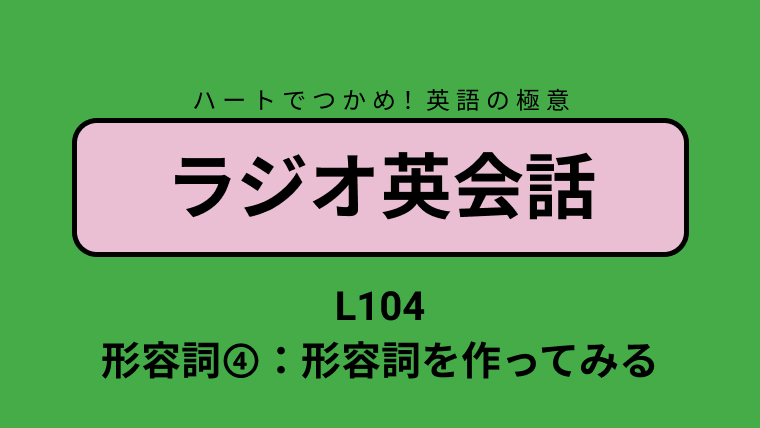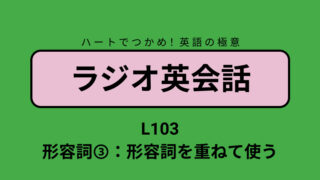NHKラジオ英会話のディクテーション「形容詞④:形容詞を作ってみる」L104 2021/9/2

ディクテーション
講師陣の英会話を書きとり(スクリプト)
大西先生、クリスさん、ろーざさんの英会話部分を書きとってみましょう!(大西先生のギャグもできるだけ書きとります。)
Opening
Ohnishi: 今回はちょっと難しいが、行けるか、マイフレンド。
ラジオ英会話ハートでつかめ英語の極意、講師の大西泰斗です。
Roza: Well, Sensei, it’s so refreshing to hear you call me your friend. Hey guys. Akino Roza here.
Chris: Chris McVay here, Chris McVay here. Can you hear me? Fixed this mic. OK, let’s get started.
Ohnishi: それでは、さっそく始めていきましょう。
ダイアログ和訳の後
今日はありませんでした。
Practice 8:00
Roza: OK guys, let’s practice together. Now, here today’s point is quite simple. Whatever you put in front of the noun becomes an adjective. That’s it. So, if you put “22-year-old” in front of “son”, it becomes an adjective. All right, so let’s practice the key sentence together. “I have a 22-year-old son, who lives in Canada”.
Great, one more time. “I have a 22-year-old son, who lives in Canada”.
Perfect.
Ending
Ohnishi: Hey guys, thank you so much for your we-always-admire-you look.
Chris: Well, that’s a mouthful.
Roza: Ah, I think you’ve mistaken for our you’d-better-watch-what-you-say look.
Chris: Anyway, these compound adjectives are a bit of mouthful but why don’t you enjoy creating some of your own. Have fun!
Roza: That’s right. You can make any kind of compound adjective you want.
・・・・
Ohnishi: さぁ今日はこの辺でおわりにしましょう。
All: Bye!
mistaken at, for ~のようにも聞こえます。(言い換えてる?)
ひとこと
今日のディクテーションです。
- Opening
- ダイアログ和訳の後(今日はありませんでした)
- Practice
- Ending
~ ディクテーションした内容やその解釈などに、聞き間違いや認識違いがある可能性はあります。ご了承ください ~


